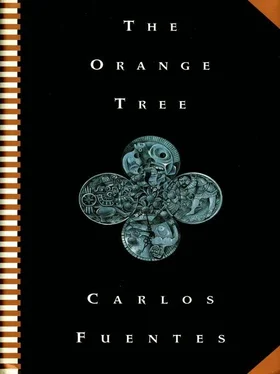22:05
I’m driving a pink jeep along the mountain highway. You can’t get lost, the hotel parking lot attendant tells me. There’s nothing until you get to the discotheque lights, you can’t miss it. He doesn’t know that the night is much more densely populated than the day, that it’s much more visual than the sun, because the night is like a gigantic Cinema-Scope screen on which you can project anything that comes into your mind.
I’m fighting the powerful breathing of the tropics, which at night becomes drunker and crazier as the rest of the world calms down. Apollo and his chariot of light have sunk into the sea. The jeep’s motor can’t drown out the cicadas, the frogs, the fireflies, or the mosquitoes. I make out other lights on the mountain that aren’t electric; they’re eyes — emerald, silver, and blood-colored eyes. Foxes, coyotes, solitary animals — like me — who feel the need for a little company — like me.
I accelerate and, thanks to the intermediary aid of my rearview mirror, project onto the screen of my mental night the picture that won me an Oscar, the first prize given by the academy to an American actor in a foreign film. I conquer the darkness with the unforgettable images of Leonello Padovani’s last film, in which I had the honor to have the lead. And the extraordinary thing is that the images of the film that I conjure up like something luminous are images of night and fog.
The film is set in northern Italy. Everything happens at night or on cloudy days. A poor man can’t stand his hardworking, good wife any longer. He doesn’t know what to do, but he’s convinced he should cut his ties with his routine life and expose himself to chance. One winter night, he abandons his wife. But he takes the only thing he really loves in his house, his nine-year-old daughter. He doesn’t take clothing or money. Only the girl. But along with her, unintentionally, he brings a past and a habit. The child follows naturally, as if any decision that affects her is neither good nor bad but natural. Especially if it’s her father who makes the decision. He wishes she would understand that he’s taken her along because he loves her. He doesn’t understand that it’s possible to love naturally, obediently. For him, love is a matter of will. He confuses the love of the heart with the love of the mind. The girl doesn’t. She loves and obeys her father without having to force herself.
For a few days, the two of them wander aimlessly through that landscape of fog and cold, relying on charity but subjected to the father’s inability to tell the child why they’ve run away and why he loves her. What does she think? Will she abandon her father? Or will she go on with him to the end? What is solitude? The absence of company or a shared abandonment? Padovani provides no answers. Each member of the audience has to provide his own.
I felt that for the only time in my life my acting was in the hands of an artist. I felt that the film went along discovering itself at the same time that he, debilitated, suffering, and, ultimately, dying, filmed it. The difference between theater and film is that movies are made in a choppy way, without continuity. Padovani managed to turn that technique into artistic creation. He transformed the obligatory method in filming — the end at the beginning, the beginning at the end — into a means of searching out the picture. Besides, in each pause between scenes, in each take, in each save, and even in each coffee break, he forced me to search out myself. It wasn’t just a matter of memorizing lines and saying that tomorrow I’ve got to do from page such-and-such to this other page. It meant searching myself out as an actor and as a man, and what I discovered is that this is what a character is: someone who exists and who acts at the same time.
In my hand, I hold the hot hand of the girl who was my audience, free to decide to abandon me or to go on with me.
Then I held the Oscar statuette in my hand, and that was ice cold.
A Short Time Later
I’m dancing by myself surrounded by a thousand persons jamming the floor of this fantastic discotheque, which is floating over Acapulco Bay like one of the hanging gardens of Babylon in one of those extravaganzas that made Cecil B. deMille famous. I never saw anything like it, because European and American discotheques are usually enclosed, surrounded by cement and gasoline. They isolate you completely, but they can also turn into death traps. Here, on the other hand, the discotheque floats over the sea, a glass bubble with a roof of stars that segue into the real Pacific firmament.
I’m not dancing with anyone, and my solitude doesn’t matter to anyone. Most of the people here are between seventeen and twenty-five. I’m past fifty-five. I don’t have complexes anymore. I dance alone, not actively conscious, my eyes closed, smiling, unhappy that I don’t have fifteen-year-olds who would do me the favor of identifying the music I’m hearing and dancing to. However, I’m shamefully satisfied when some song from my own youth—“Michelle” by the Beatles, “Satisfaction” by the Stones, or “Monday Monday” by the Mamas and the Papas — sneaks into the endless rock tape whose energy spreads from the song you can dance to while hugging someone to acid rock, which demands individual, savage frenzy — the return to the tribe, the clan, the oldest and most forgotten blood ties.
An image of Ireland, the land of my fathers, crosses before my black eyes. A valley inundated with dew. A bay, which in reality is a valley flooded by the catastrophes of time. And in the center a white island where the wild ducks gather. A white chestnut forest, white, white, all smothered in its own whiteness.
I close my eyes in order to feel all that, and when I suddenly open them I’m no longer alone. My wife is dancing with me, created by my eyes (my eyes: my desire), staring at my outfit, my Gucci loafers, criticizing me for not wearing socks, and I’m telling her that in Italy no one wears socks in summer with loafers, to which she replies that I look sloppy. What? My beige slacks, my pink shirt that looks (I only realize it now) like an ad for the hotel where I’m staying? And she says to me:
“Everything you know you learned in Italy, right?”
“No, you taught me everything.”
I say it trying to be agreeable, knowing it’s just an illusion on my part.
“You’re right. With me, you had your Hollywood career. A good career at that. You know what I mean: I mean good. You had a personality, a secure place, audiences knew who you were. You know what I mean: they knew who you were. ”
“Come on, all I ever made were B films, don’t try to put one over on me or on yourself. I was typed as a hood, a gangster, the guy who always loses the girl.”
“Stop complaining. You kissed Susan Hayward, Janet Leigh, Lizabeth Scott … You probably even slept with them.”
“Cindy, Italy got me out of a rut.”
“You know what I mean? Audiences knew who you were. That’s what counts in this business.”
“What you mean is that I was character-typed.”
“Did you really go to bed with Lizabeth Scott?”
“All I ever did was offer them my arm to walk down one of those marble stairways. Universal had its own ideas about what the mansions of rich Americans look like. Marble stairways.”
“You always liked blondes.”
“Like you.”
“No, husky-voiced blondes like Lizabeth Scott.”
“I offered them my arm. They might have slipped.”
“Husky-voiced, blond, and with thick, black eyebrows, like yours and Lizabeth’s.”
“They would wear incredibly high heels so they wouldn’t look like midgets next to me. Or they’d stay one step above me. Stairs are indispensable to create illusions in movies. Just tricks, sweetheart. Like the kisses. You’re kissing Lizabeth Scott, but you’re thinking about the rent. And you know it. So don’t get jealous.”
Читать дальше












